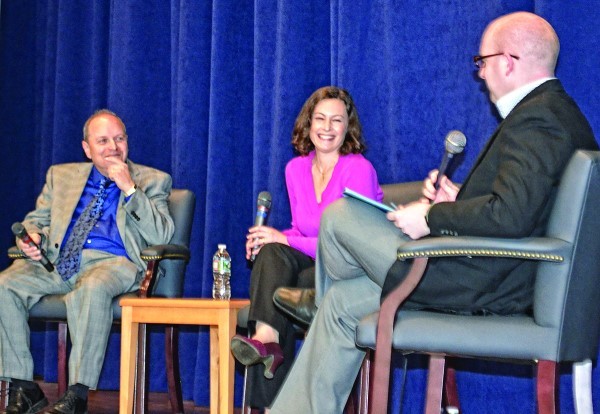R.I. news leaders check and double-check their sources in this era of ‘fake news’
PROVIDENCE – Leaders of two of the largest news organizations in Rhode Island shared some insights about what goes into reporting the news at the first Tribe Talk, held Dec. 10 at the Alliance’s Dwares Jewish Community Center.
Alan Rosenberg, executive editor of The Providence Journal, and Elisabeth Harrison, news director of Rhode Island Public Radio (WRNI), offered their views on covering the news in Rhode Island and ongoing issues such as anti-Semitism, bias and racism. The conversation was moderated by Adam Greenman, president and CEO of the Jewish Alliance of Greater Rhode Island, and sponsored by The Jewish Voice and the Alliance.
Rosenberg, who has been executive editor since May, has worked in a variety of positions at The Journal, from reporter to managing editor. He’s also well known to members of Providence’s Temple Beth-El, where he was a longtime religious school teacher. Harrison, who came to WRNI as a producer in 2007, steadily rose through the ranks to news director.
Greenman asked both how their Judaism and their roles as journalists intersect. Rosenberg said, “there is a Jewish lens that I see things through and at the same time I try to be careful not to let that lens overwhelm. I try to be careful to also keep an objective lens.”
Harrison added, “We all come to our jobs as journalists with a personal lens and we strive to put that aside to be as objective as we can to represent all perspectives.” She said her desire to embrace so many different perspectives had its roots in how she grew up, and informed her career choice and the way she now reports.
Tribe Talk came at the end of a week that included President Trump recognizing Jerusalem as the capital of Israel as well as the bombing of a synagogue in Sweden. Harrison and Rosenberg discussed coverage in these times of fast-moving, fast-changing news. They also touched on the differences between WRNI and The Journal.
WRNI has a much smaller newsroom than The Journal but it has the benefit of a national network of reporters via National Public Radio.
And there was a conversation about what makes news. Geography is a big factor, says Rosenberg: the closer the news event is to your coverage area, the bigger the play it gets. But there are other factors. “What makes something news is, in part, its unusualness,” he said.
Both Harrison and Rosenberg said they were disturbed by the term “fake news.”
Both emphasized that it’s more important than ever to make sure the stories they are telling have been double-checked for accuracy.
“It’s our job to verify everyone who speaks to us,” said Harrison. “People appreciate that.”
“It all comes back to ‘who says?’ ” said Rosenberg. “How do we know that the people we are talking to are who they say they are? Until we can confirm who they are, we can’t use their information. We can’t be in a position to be exposed as fake news.”
A variety of other topics included newspaper consolidation, how the different news organizations tell the same story and helping non-Jews understand the multiple points of view within the Jewish community. The need for a free press was an ongoing topic.
A lively question-and-answer session followed the presentation.
Tribe Talk is a series of presentations that will be held at locations around Rhode Island. It’s meant to be an edgy and lively conversation between panelists and the audience about current events and issues. The next program is Jan. 28, at Temple Sinai, in Cranston, where Rabbi Jeff Goldwasser will moderate a conversation on civil rights and social justice. More details will be available in the next Jewish Voice.
FRAN OSTENDORF is the editor of The Jewish Voice.








